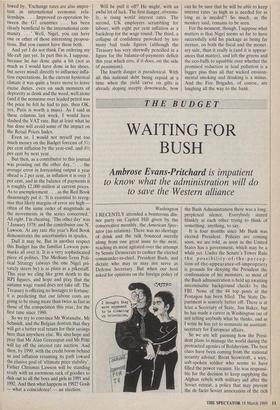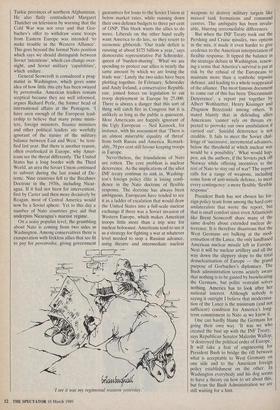THE BUDGET
WAITING FOR BUSH
Ambrose Evans-Pritchard is impatient
to know what the administration will do to save the Western alliance
Washington I RECENTLY attended a boisterous din- ner party on Capitol Hill given by the conservative monthly, the American Spec- tator (no relation). There was no shortage of drink and the talk bounced merrily along from one great issue to the next, reaching its most agitated over the attempt by Senate Democrats to cashier the elected commander-in-chief, President Bush, and dictate who may or may not serve as Defense Secretary. But when our host asked for opinions on the foreign policy of
the Bush Administration there was a long, perplexed silence. Everybody stared blankly at each other trying to think of something, anything, to say.
It is four months since Mr Bush was elected President. Policies are coming soon, we are told, as soon as the United States has a government, which may be a while yet. Under the Senate's Tower Rule the possibility-of-the-percep- tion-of-the-appearance-of-impropriety is grounds for denying the President the confirmation of his ministers, so most of the Bush administration is held up awaiting interminable background checks by the FBI. None of the 44 top posts at the Pentagon has been filled. The State De- partment is scarcely better off. There is at least a Secretary of State, Jim Baker, but he has made a career in Washington out of not telling anybody what he thinks, and as I write he has yet to nominate an assistant- secretary for European affairs.
So we are left guessing how the Presi- dent plans to manage the world during the protracted agonies of Bolshevism. The best clues have been coming from the national security adviser, Brent Scowcroft, a wiry, soft-spoken soldier who seems to have filled the power vacuum. He was responsi- ble for the decision to keep supplying the Afghan rebels with military aid after the Soviet retreat, a policy that may prevent the de facto Soviet annexation of the rich Turkic provinces of northern Afghanistan. He also flatly contradicted Margaret Thatcher on television by warning that the Cold War was not over and that Gor- bachev's offer to withdraw some troops from Eastern Europe was intended 'to make trouble in the Western Alliance'. This goes beyond the formal Nato position which says we should distinguish between Soviet 'intentions', which can change over- night, and Soviet military 'capabilities', which endure.
General Scowcroft is considered a prag- matist in Washington, which gives some idea of how little this city has been swayed by perestroika. American leaders remain sceptical because they are well informed, argues Richard Perle, the former head of international affairs at the Pentagon. 'I have seen enough of the European lead- ership to believe that many prime minis- ters, foreign ministers, finance ministers and other political leaders are woefully ignorant of the nature of the military balance between East and West,' he testi- fied last year. But there is another reason, often overlooked in Europe, why Amer- icans see the threat differently. The United States has a long border with the Third World, an area the Soviet Union continued to subvert during the last round of De- tente. Nine countries fell to the Brezhnev Doctrine in the 1970s, including Nicar- agua. If it had not been for intervention, first by Carter and then more decisively by Reagan, most of Central America would now be a Soviet sphere. Yet to this day a number of Nato countries give aid that underpins Nicaragua's marxist regime.
On a noisy populist level, the grumbling about Nato is coming from two sides in Washington. Among conservatives there is exasperation with feckless allies that see fit to pay for perestroika, giving government guarantees for loans to the Soviet Union at below market rates, while running down their own defence budgets to three per cent of GNP. This block wants the allies to do more. Liberals on the other hand really want America to do less, so they resort to economic gibberish. 'Our trade deficit is running at about $175 billion a year,' says democratic representative Pat Schroeder, queen of 'burden-sharing'. 'What we are spending to protect our allies is nearly the same amount by which we are losing the trade war.' Lately the two sides have been plotting together. In February, Schroeder and Andy Ireland, a conservative Republi- can, joined forces on legislation to cut troop deployment in Europe by 25,000. There is always a danger that this sort of thing will catch fire in Congress but it is unlikely as long as the public is quiescent. Most Americans are happily ignorant of the Ugly European — Neil Kinnock, for instance, with his assessment that `There is an almost miserable equality of threat' from both Russia and America. Remark- ably, 70 per cent still favour keeping troops in Europe.
Nevertheless, the foundations of Nato are rotten. The core problem is nuclear deterrence. As the implications of the idiot INF treaty continue to sink in, Washing- ton's foreign policy elite is losing confi- dence in the Nato doctrine of flexible response. The doctrine has always been ambiguous. Europeans have tended to see it as a ladder of escalation that would draw the United States into a full-scale nuclear exchange if there was a Soviet invasion of Western Europe, which makes American troops little more than a trip wire for nuclear holocaust. Americans tend to see it as a strategy for fighting a war at whatever level needed to stop a Russian advance, using theatre and intermediate nuclear 'I see it was my regimental reunion yesterday.' weapons. to destroy military targets like massed tank formations and command centres. The ambiguity has been invalu- able, blurring irreconcilable differences.
But when the INF Treaty took out the Pershing and Cruise missiles, two options in the mix, it made it even harder to give credence to the American interpretation of flexible response. It tipped the balance in the strategic debate in Washington, renew- ing a sense that America's survival is put at risk by the refusal of the Europeans to maintain more than a symbolic tripwire defence, and leading to a whole reappraisal of the alliance. The most famous document to come out of this has been `Discriminate Deterrence', a report put together by Albert Wohlstetter, Henry Kissinger and Zbigniew Brzezinski among others. It stated bluntly that in defending allies Americans 'cannot rely on threats ex- pected to provoke our own annihilation if carried out'. Suicidal deterrence is not credible. It fails to meet the Soviet chal- lenge of `successive, incremental advances, below the threshold at which nuclear war would be a possibility'. What would hap- pen, ask the authors, if the Soviets pick off Norway while offering incentives to the rest of Nato to stay out of war? The report calls for a range of weapons, including some form of anti-missile defence, to meet every contingency: a more flexible 'flexible response'.
President Bush has not chosen his for- eign policy team from among the hard core unilateralists that wrote the report, but that is small comfort since even Atlanticists like Brent Scowcroft share many of the same doubts about extended nuclear de- terrence. It is therefore disastrous that the West Germans are balking at the mod- ernisation of the Lance, the only landbased American nuclear missile left in Europe. Next it will be nuclear artillery and all the way down the slippery slope to the total denuclearisation of Europe — the grand purpose of Gorbachev's diplomacy. The Bush administration seems acutely, aware that nothing is to be gained by browbeating the Germans, but polite restraint solves nothing. America has to look after her national interest. Although nobody is saying it outright I believe that modernisa- tion of the Lance is the minimum (and not sufficient) condition for America's long- term commitment to Nato as we know it.
One can hardly blame the Germans for going their own way. `It was we who, created the bust up with the INF Treaty,' says Republican Senator Malcolm Wallop, `it destroyed the political order of Europe.' It will take a feat of engineering for President Bush to bridge the rift between what is acceptable to West Germany on one side and to the American foreign policy establishment on the other. In Washington everybody and his dog seems to have a theory on how to set about this, but from the Bush Administration we are still waiting for a hint.



























































 Previous page
Previous page